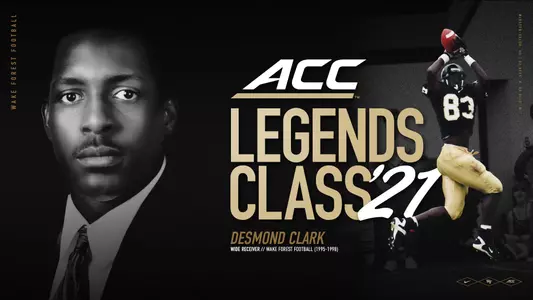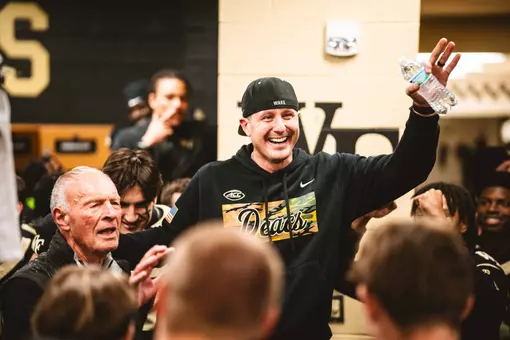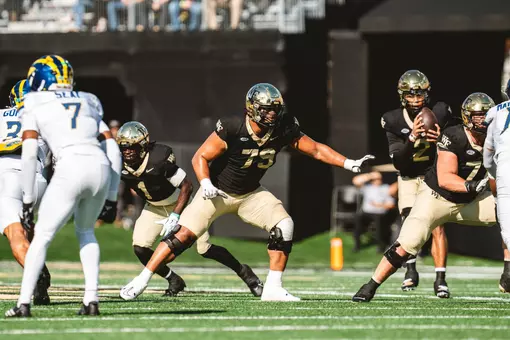Wake Forest Athletics

ACC Legend: Desmond Clark’s Daily Mindset Set Course for Incredible Career
11/9/2021 9:45:00 AM | Football, General
“I grew leaps and bounds as a person at Wake Forest. Those relationships and being around different people, helped me learn more about different cultures. Leaving Wake Forest I became so much more of a well-rounded human.” -- Desmond Clark
GREENSBORO, N.C. -- After a record-breaking collegiate career at Wake Forest and 12 years in the NFL, Desmond Clark will be honored as Wake Forest's ACC Legend this year at a ceremony on Friday, Dec. 3 in Charlotte.
"It's definitely an honor and something that came up out of the blue," Clark said. "To represent Wake Forest in this way is a privilege and an honor."
Desmond Clark joins an iconic list of Demon Deacons to have earned this honor:
Clark's journey to Wake Forest in the mid-90s began with a strong relationship with then-coach Jim Caldwell and his staff.
"It was the coaches," Clark explained. "Wake Forest found me. Coach Caldwell was the head coach at the time, and had an assistant who was from my hometown. That's how the connection began. As I was getting recruited by Wake Forest, Coach Caldwell really stuck out to me, with his approach and demeanor. It came down to Wake Forest and Virginia Tech, and at the time Virginia Tech was pretty good."
Having played quarterback, safety and linebacker in high school, Clark knew he wanted to play on offense, and Wake Forest promised him that opportunity where others did not.
"I didn't want to go into a program as an athlete, not knowing where I was going to play," he said. "I definitely didn't want to play on the defensive side of the ball. Wake Forest offered me the opportunity to play receiver. I played option quarterback in high school. They told me I would definitely play receiver, then when you add in the academic aspects, it turned out to be the right decision for me.
"Coach Caldwell, academics and the chance to play receiver — those were the three things that brought me to Wake Forest."
Assessing his competition in his first full camp at Wake Forest, Clark began setting goals.
"What is it that I'm here to do?" he asked himself. "Once I got on the field and learned what the competition was like, my first goal was just to be on the field to play. I played my freshman year and caught 20-something (24) balls."
He had 61 receptions for 782 yards and six touchdowns as a sophomore and then put together arguably his best campaign as a junior in 1997 with 72 receptions for 950 yards.
"The next year I went from just wanting to play to earning a starting role," Clark said about the evolution of his mindset. "I wanted to become the best on this team and the best in the ACC. The reason I had that success is having those goals, and then being willing to put in the work.
"I felt like if I wanted to be in the same category as some of the best in the conference, I needed to put in that same level of work. It started with a mindset then established itself with the work ethic."
He left as the all-time Wake Forest leader in career receptions (216), a mark that was surpassed by Michael Campanaro 15 years later (229). Clark is still second on that list and is also second in program history with 2,834 receiving yards, trailing just Ricky Proehl (2,949).
"Success is a choice," Clark maintains. "I had to choose that I wanted to be a successful receiver at Wake Forest, then the level of sustained success comes down to the discipline that you put into the craft of whatever you're doing. I just had to continue to get better every single year."
Clark was selected as a tight end in the sixth round of the 1999 NFL Draft by the Denver Broncos, and finished his career with an eight-year stint with the Chicago Bears. He played in 162 career games, starting 105 and finishing with 323 career receptions for 3,591 yards and 27 touchdowns.
"Being drafted in the sixth round to the two-time NFL Champion Denver Broncos, coming in as the fourth tight end when they'd only kept three the previous few years was an intimidating experience," Clark remembers. "Once I stopped looking outside and just focused on building myself to what I wanted to be was the first step in knowing I belonged in the NFL."
At one time, Clark had started in 68 consecutive games.
"There are people coming in every year who are wanting the position you have, so if you're not getting better, you're getting left behind," he said. "Every year I had to be disciplined, do the work and keep myself in shape. I had to do the little things to maintain that level of excellence to stay on the field and produce. All the other things like catches, touchdowns and having the longevity to play 12 years happens after that. But it happens because of choosing the mindset you have and putting in the discipline to continually hone your craft."
His 2006 Chicago Bears finished 13-3 advancing all the way to the Super Bowl against the Indianapolis Colts — which took place in Miami, Florida at Dolphin Stadium, the same location where just a month prior Wake Forest had squared off against Louisville in the Orange Bowl.
"Both played in Miami," Clark said. "That was a special year all the way around personally, being an alumni of Wake Forest University.
"I got to Wake Forest from Florida without having a lot of worldly experience. I grew leaps and bounds as a person at Wake Forest. Those relationships and being around different people, helped me learn more about different cultures. Leaving Wake Forest I became so much more of a well-rounded human. That's helped me just as much as the education and being a better athlete."
Clark is currently parlaying the leadership skills he gains from coaches during his football career with his real-life experiences as a successful public speaker, financial advisor and author.
"I'm having a blast as a speaker and financial advisor by helping other people succeed through the coaching I had in my life in leadership, team building and finances," he said. "I'm just combining all this knowledge from all the great leaders I've been around, and sharing that as a speaker to assist with leadership development."
"It's definitely an honor and something that came up out of the blue," Clark said. "To represent Wake Forest in this way is a privilege and an honor."
Desmond Clark joins an iconic list of Demon Deacons to have earned this honor:
- 2005: Safety Bill Armstrong, 1973-76
- 2006: Running Back James McDougald, 1976-79
- 2007: Quarterback Norm Snead, 1958-60
- 2008: Tight End John Henry Mills, 1988-92
- 2009: Running Back Bill Barnes, 1954-56
- 2010: Running Back Larry Hopkins, 1970-71
- 2011: Quarterback Larry Russell, 1969-71
- 2012: Linebacker Ed Stetz, 1969-71
- 2013: Quarterback Jay Venuto, 1979-80
- 2014: Running Back Alan White, 1959-61
- 2015: Kicker Chuck Ramsay, 1971-73
- 2017: Punter Ryan Plackemeier, 2002-05
- 2018: Center Steve Justice, 2004-07
- 2019: Offensive & Defensive Tackle Bob McCreary, 1958-60
- 2021: Wide Receiver Desmond Clark, 1995-98
Clark's journey to Wake Forest in the mid-90s began with a strong relationship with then-coach Jim Caldwell and his staff.
"It was the coaches," Clark explained. "Wake Forest found me. Coach Caldwell was the head coach at the time, and had an assistant who was from my hometown. That's how the connection began. As I was getting recruited by Wake Forest, Coach Caldwell really stuck out to me, with his approach and demeanor. It came down to Wake Forest and Virginia Tech, and at the time Virginia Tech was pretty good."
Having played quarterback, safety and linebacker in high school, Clark knew he wanted to play on offense, and Wake Forest promised him that opportunity where others did not.
"I didn't want to go into a program as an athlete, not knowing where I was going to play," he said. "I definitely didn't want to play on the defensive side of the ball. Wake Forest offered me the opportunity to play receiver. I played option quarterback in high school. They told me I would definitely play receiver, then when you add in the academic aspects, it turned out to be the right decision for me.
"Coach Caldwell, academics and the chance to play receiver — those were the three things that brought me to Wake Forest."
Assessing his competition in his first full camp at Wake Forest, Clark began setting goals.
"What is it that I'm here to do?" he asked himself. "Once I got on the field and learned what the competition was like, my first goal was just to be on the field to play. I played my freshman year and caught 20-something (24) balls."
He had 61 receptions for 782 yards and six touchdowns as a sophomore and then put together arguably his best campaign as a junior in 1997 with 72 receptions for 950 yards.
"The next year I went from just wanting to play to earning a starting role," Clark said about the evolution of his mindset. "I wanted to become the best on this team and the best in the ACC. The reason I had that success is having those goals, and then being willing to put in the work.
"I felt like if I wanted to be in the same category as some of the best in the conference, I needed to put in that same level of work. It started with a mindset then established itself with the work ethic."
He left as the all-time Wake Forest leader in career receptions (216), a mark that was surpassed by Michael Campanaro 15 years later (229). Clark is still second on that list and is also second in program history with 2,834 receiving yards, trailing just Ricky Proehl (2,949).
"Success is a choice," Clark maintains. "I had to choose that I wanted to be a successful receiver at Wake Forest, then the level of sustained success comes down to the discipline that you put into the craft of whatever you're doing. I just had to continue to get better every single year."
Clark was selected as a tight end in the sixth round of the 1999 NFL Draft by the Denver Broncos, and finished his career with an eight-year stint with the Chicago Bears. He played in 162 career games, starting 105 and finishing with 323 career receptions for 3,591 yards and 27 touchdowns.
"Being drafted in the sixth round to the two-time NFL Champion Denver Broncos, coming in as the fourth tight end when they'd only kept three the previous few years was an intimidating experience," Clark remembers. "Once I stopped looking outside and just focused on building myself to what I wanted to be was the first step in knowing I belonged in the NFL."
At one time, Clark had started in 68 consecutive games.
"There are people coming in every year who are wanting the position you have, so if you're not getting better, you're getting left behind," he said. "Every year I had to be disciplined, do the work and keep myself in shape. I had to do the little things to maintain that level of excellence to stay on the field and produce. All the other things like catches, touchdowns and having the longevity to play 12 years happens after that. But it happens because of choosing the mindset you have and putting in the discipline to continually hone your craft."
His 2006 Chicago Bears finished 13-3 advancing all the way to the Super Bowl against the Indianapolis Colts — which took place in Miami, Florida at Dolphin Stadium, the same location where just a month prior Wake Forest had squared off against Louisville in the Orange Bowl.
"Both played in Miami," Clark said. "That was a special year all the way around personally, being an alumni of Wake Forest University.
"I got to Wake Forest from Florida without having a lot of worldly experience. I grew leaps and bounds as a person at Wake Forest. Those relationships and being around different people, helped me learn more about different cultures. Leaving Wake Forest I became so much more of a well-rounded human. That's helped me just as much as the education and being a better athlete."
Clark is currently parlaying the leadership skills he gains from coaches during his football career with his real-life experiences as a successful public speaker, financial advisor and author.
"I'm having a blast as a speaker and financial advisor by helping other people succeed through the coaching I had in my life in leadership, team building and finances," he said. "I'm just combining all this knowledge from all the great leaders I've been around, and sharing that as a speaker to assist with leadership development."
Steve Forbes - Postgame Presser vs. Clemson
Thursday, February 19
Steve Forbes - Postgame Presser vs. Stanford
Sunday, February 15
Wake Forest Baseball 2026 Opening Day Trailer
Friday, February 13
Steve Forbes - Postgame Presser at Georgia Tech
Thursday, February 12



